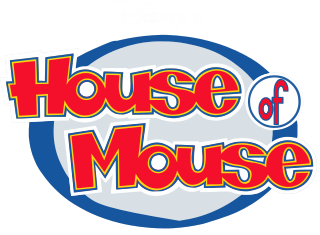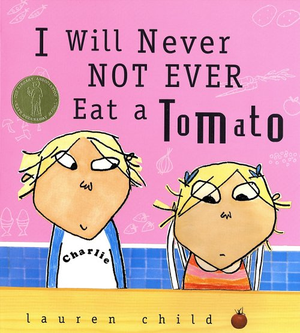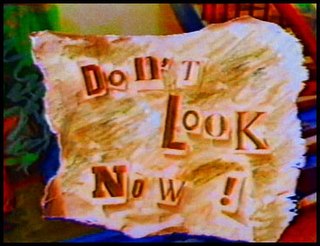
Xena: Warrior Princess is an American fantasy television series filmed in New Zealand, which aired in first-run syndication from September 4, 1995, to June 18, 2001. Critics have praised the series for its strong female protagonist, and it has acquired a strong cult following, attention in fandom, parody, and academia, and has influenced the direction of other television series.

Disney's House of Mouse is an American animated television series produced by Walt Disney Television Animation that originally aired on ABC and Toon Disney from January 13, 2001, to October 24, 2003, with 52 episodes and 22 newly produced cartoon shorts made for the series. The show focuses on Mickey Mouse and his friends running a cartoon theater dinner club in the fictional setting of ToonTown, catering to many characters from Disney cartoons and animated movies while showcasing a variety of their cartoon shorts. The series is named after a common nickname or epithet for the Walt Disney Company.

Superman: The Animated Series is an American animated superhero television series based on the DC Comics character Superman. It was produced by Warner Bros. Animation and originally aired on Kids' WB from September 6, 1996, to February 12, 2000. It was the second series in the DC Animated Universe after Batman: The Animated Series, and like its predecessor, it has been acclaimed for its writing, voice acting, maturity, and modernization of the title character's comic-book mythos.

Mr. Bean is a British sitcom created by Rowan Atkinson and Richard Curtis, produced by Tiger Aspect Productions and starring Atkinson as the eponymous title character. The sitcom consists of 15 episodes that were co-written by Atkinson alongside Curtis and Robin Driscoll; the pilot episode was co-written by Ben Elton. The series originally aired on ITV, beginning with the pilot episode on 1 January 1990 and ending with "The Best Bits of Mr. Bean" on 15 December 1995.

Doug is an American animated sitcom created by Jim Jinkins and produced by Jumbo Pictures, airing from August 11, 1991 to June 26, 1999 on Nickelodeon and ABC. The show focuses on the early adolescent life and zany hijinks of its title character, Douglas "Doug" Funnie, who experiences common predicaments while attending school in his new hometown of Bluffington. Doug narrates each story in his journal, and the show incorporates many imagination sequences. The series addresses numerous topics, including trying to fit in, platonic and romantic relationships, self-esteem, bullying, and rumors. Many episodes center on Doug's attempts to impress his classmate and crush, Patti Mayonnaise.

El Chapulín Colorado is a Mexican television comedy series that aired from 1973 to 1979 and parodied superhero shows. It was created by Roberto Gómez Bolaños (Chespirito), who also played the main character. It was first aired by Televisa in 1973 in Mexico, and then was aired across Latin America and Spain until 1981, alongside El Chavo del Ocho, which shared the same cast of actors. Both shows have endured in re-runs and have won back some of their popularity in several countries such as Brazil, Colombia or Peru. Although the series has a regular cast, all actors but Gómez Bolaños play different characters each episode, and it is therefore described as an anthology series.
A title sequence is the method by which films or television programmes present their title and key production and cast members, utilizing conceptual visuals and sound. It typically includes the text of the opening credits, and helps establish the setting and tone of the program. It may consist of live action, animation, music, still images, and/or graphics. In some films, the title sequence is preceded by a cold open.

Happy Tree Friends is an adult animated web series created by Aubrey Ankrum, Rhode Montijo, and Kenn Navarro, and developed by Montijo, Navarro, and Warren Graff for Mondo Media. Disguised as a kids' cartoon, the show follows the misadventures of cute anthropomorphic forest animals, whose initially peaceful lives always end with sudden, usually accidental, graphically violent incidents. Debuting on December 24, 1999, Happy Tree Friends has achieved a cult following on Mondo's website and YouTube channel and expanded into a multimedia franchise, which includes the television series of the same name.

Rejected is a 2000 animated surrealist short comedy film directed by Don Hertzfeldt that was released in 2000. It was nominated for an Academy Award for Best Animated Short Film the following year at the 73rd Academy Awards, and received 27 awards from film festivals around the world.
A compilation film, or compilation movie is a film composed of scenes and shots taken from two or more prior films or television programs and edited together so as to make a new film, whether on the same or a different subject. The most common example would be a documentary film on an historical event composed of footage from various newsreels and other film documentaries on the same subject. New footage and/or a new soundtrack may also be included in a compilation film, but the compiled, older footage makes up the majority of its principal material. Compilation film does not include, however, a simple editing together of several short films, complete in themselves and distinguished as such from each others, which should be considered as film anthologies.

Adobe Flash animation is an animation that is created with the Adobe Animate platform or similar animation software and often distributed in the SWF file format. The term Adobe Flash animation refers to both the file format and the medium in which the animation is produced. Adobe Flash animation has enjoyed mainstream popularity since the mid-2000s, with many Adobe Flash-animated television series, television commercials, and award-winning online shorts being produced since then.

Charlie and Lola are fictional children created by the English writer and illustrator Lauren Child in 2000. They were introduced in a series of picture books and later adapted as animated television characters. Lola is an energetic and imaginative little girl; Charlie is her kind and patient older brother who is always willing to help Lola learn and grow. Charlie and Lola's parents, as well as their friends' parents, are often mentioned, but never seen.

Video on Trial is a Canadian comedy television program that airs on Canadian television network MuchMusic. The show consists of a panel of musicians, comedians, and entertainment columnists critiquing five different music videos in a courtroom-esque manner. The panel acts as the jurors, poking fun at and questioning each artist's behaviour in each video. Artists' personal lives and off-set behaviour are usually mocked by the critics in relation to the music video. They are shown in separate clips to use their opinions.
LATV is an American bilingual broadcast television network, digital publisher and media company owned by LATV Networks, LLC. The network primarily carries original inclusive programming including music, talk and variety series aimed at Hispanic and Latino American teenagers and young adults between the ages of 18 and 55. From early on, LATV has characterized itself for featuring Latin Alternative musicians such as La Ley, Zayra Alvarez, Jaguares, Julieta Venegas, Enrique Bunbury, Ely Guerra, and Aterciopelados on its shows.

A television show, TV program, or simply a TV show, is the general reference to any content produced for viewing on a television set that is traditionally broadcast via over-the-air, satellite, or cable. This includes content made by television broadcasters and content made for broadcasting by film production companies. It excludes breaking news, advertisements, or trailers that are typically placed between shows. Television shows are most often scheduled for broadcast well ahead of time and appear on electronic guides or other TV listings, but streaming services often make them available for viewing anytime. The content in a television show is produced by one of two production methodologies: live taped shows such as variety and news magazine shows shot on a television studio stage or sporting events The other production model includes animation and a variety of film productions ranging from movies to series. Shows not produced on a television studio stage are usually contracted or licensed to be made by appropriate production companies.
VeggieTales is an American Christian CGI-animated series and franchise for children created by Phil Vischer and Mike Nawrocki under Big Idea Entertainment. The series stars Bob the Tomato and Larry the Cucumber leading a variety of fruit and vegetable characters as they retell stories from the Bible and parody pop culture while also teaching life lessons according to a biblical world view.
Red Letter Media, LLC is an American film and video production company operated by independent filmmakers Mike Stoklasa and Jay Bauman. It was formed by Stoklasa in 2004 while he was living in Scottsdale, Arizona, but has long been based in Milwaukee, Wisconsin. It attracted significant attention in 2009 through Stoklasa's 70-minute video essay review of the 1999 film Star Wars: Episode I – The Phantom Menace. The review was posted in seven parts on YouTube, and was presented by his character "Harry S. Plinkett". While Stoklasa had prior success with prior other video reviews of several Star Trek films, his Phantom Menace and subsequent Star Wars prequel review went viral and were praised for both content and presentation.
Powerhouse Animation Studios, Inc. is an American animation studio based in Austin, Texas. It was founded in April 2001 with a subsidiary called Powerhouse Animation LLC, established in the summer of 2014. The company develops and produces traditional 2D animation, motion comics, motion graphics, art assets, digital paint, illustration for television series, motion pictures, video game cinemas, commercials, advertising campaigns, educational properties, and entertainment companies.

Don't Look Now is an American national children's sketch comedy show produced for PBS by WGBH-TV in Boston, Massachusetts, and created by Geoffrey Darby and Roger Price. It is a clone of their program for CTV and Nickelodeon, You Can't Do That on Television. The first episode aired on October 2, 1983, and showed its final episode on October 30, 1983. It was originally slated to be called Don't Tell Your Mother, but was later changed to its final title, Don't Look Now, due to PBS executive's concern that the title would encourage children to keep secrets from their parents. It was created out of uncertainty that their top show You Can't Do That on Television would continue, and was cancelled possibly due to the complaints of parents for its content, and also Nickelodeon's concern that if had it not been cancelled it may have spelled the end of You Can't Do That on Television.
A reaction video, or a react video, is a video in which one or more persons react to something. Videos showing the emotional reactions, criticism or commentary of people viewing movies, television series episodes, film trailers, music videos, news, or other media are numerous and popular on online video hosting services such as YouTube and live-streaming services such as Twitch. The depicted persons may not even be aware that they are being recorded. In many cases, the video to which people are reacting is shown within the reaction video, letting viewers see what is being reacted to.











